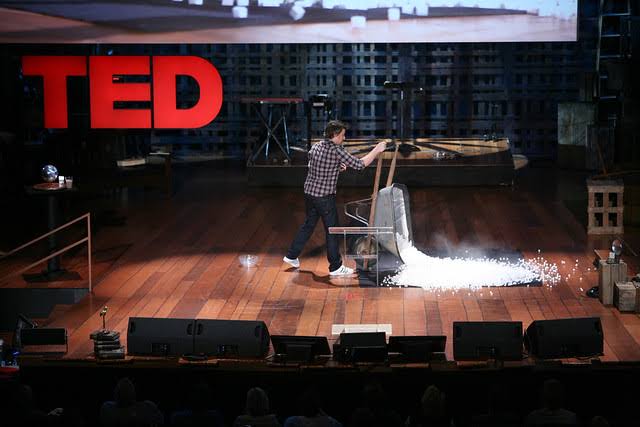英BBCの料理番組『裸のシェフ』で人気の料理人ジェイミー・オリバー(Jamie Oliver)のTEDスピーチの英語を徹底解説する。日本語訳なしでも理解できるよう、単語と文法をわかりやすくご説明する。日本語訳ではわからない、ジェイミー・オリバーの本当のメッセージを感じて欲しい。
スピーチの題名は「Teach every child about food」(子ども達に食の教育を!)(2010年2月収録)だ。ジェイミーは、肥満撲滅プロジェクトの経験を通して、子どもへの「食育」の重要性を語っている。「食」とイギリス英語に興味がある方におすすめ。
なお、TED Talk でのオリジナルスピーチの画像は「Teach every child about food」で楽しんでほしい。
また、このスピーチはトータルで20分ある。全て一つのコラムにアップすると重くなるので4つのコラムに分けた。このコラムは3つ目だ。1つ目は「ジェイミー・オリバーの英語❶|子どもに食育を!TEDを徹底解説」で楽しんで頂きたい。
Now, the reality is, the food that your kids get every day is fast food, it’s highly processed, there’s not enough fresh food in there at all. You know, the amount of additives, E numbers, ingredients you wouldn’t believe — there’s not enough veggies at all. French fries are considered a vegetable. Pizza for breakfast. They don’t even get crockery. Knives and forks? No, they’re too dangerous. They have scissors in the classroom, but knives and forks? No. And the way I look at it is: If you don’t have knives and forks in your school, you’re purely endorsing, from a state level, fast food, because it’s handheld. And yes, by the way, it is fast food: It’s sloppy Joes, it’s burgers, it’s wieners, it’s pizzas, it’s all of that stuff.
the food that your kids get every day: ここまでが主語。 “that” は関係代名詞。 “get” はここでは「食べる」の意。
fast food: ファストフード
in there: その中に ⇨ ここでは「ファストフードの中に」の意。
E numbers: E 番号(EU で使用されている、食品添加物に付与される分類番号)
you wouldn’t believe: 「あなたが信じないであろう」の意。
veggies (口語) 野菜 = vegetables
considered /kənsídərd/ (形) (be〜) 見なされる
Pizza for breakfast: 「朝食にピッツァ!」のニュアンス。
crockery /krɔ́k(ə)ri/ (名) 食事用陶器類
the way (in which) I look at it is 〜: カッコ内の前置詞+関係代名詞が省略されている。“it” までが主語で「私のそれの見方は〜です」の意。
If you 〜: 条件説「もし〜ならば」を導く接続詞。仮定法ではない。
purely /háili/ (副) 完全に
endorse /endɔ́ːrs/ (動) 承認する
state level: 国家レベル ⇨ “from a state level” をカッコに入れると理解しやすい。
handheld /hǽndhɛ́ld/ (形) 手に持てる
sloppy Joes: パテではなく、牛挽肉、タマネギ、トマトソース、ウスター ソースなどから作ったものをバンズで挟んだファストフード
wiener /wíːnər/ (名) フランクフルト・ソーセージ
it’s all of that stuff: “it” “fast food” を示す。 “that stuff”「そのようなもの」の意。
Ten percent of what we spend on health care, as I said earlier, is on obesity, and it’s going to double. We’re not teaching our kids. There’s no statutory right to teach kids about food, elementary or secondary school, OK? We don’t teach kids about food, right? And this is a little clip from an elementary school, which is very common in England.
Ten percent of what we spend on health care: ここまでが主語。 “what” は先行詞を含む関係代名詞で「〜のこと/もの」の意。 “spend 〜 on …”「…に〜を費やす」の意。全体では「我々が “health care” に費やす金額の 10%」。
double /dʌ́bl/ (動) 倍になる
statutory /stǽtʃətɔ̀ːri/ (形) 法定の ⇨ “statutory right”「 制定法上の権利」
secondary school: 〈英〉通常 “elementary school” を卒業した 11~16 歳までの生徒が通う学校。 〈米〉通常 9~12 学年の高等学校(high school)を指す。
a little: ここでは「短い」の意。
clip /klíp/ (名) 録画ビデオの一部 = video clip
which is 〜: “which” は関係代名詞で、文法的には先行詞は “a little clip” だが、意味的には画像の中身が先行詞。ここでは “which” の前にカンマがあるので非限定用法で、関係代名詞以降は補足の情報。
(Video)
Jamie Oliver: Who knows what this is? Child: Potatoes.
JO: Potato? So, you think these are potatoes? Do you know what that is? Do you know what that is?
Child: Broccoli?
JO: What about this? Our good old friend.
Child: Celery.
JO: No. What do you think this is?
Child: Onion. JO: Onion? No.
JO: Immediately you get a really clear sense of “Do the kids know anything about where food comes from?” Who knows what that is?
Child: Uh, pear?
JO: What do you think this is?
Child: I don’t know.
JO: If the kids don’t know what stuff is, then they will never eat it.
(Do) you think these are potatoes?: カッコ内が省略されている。
broccoli /brɑ́kəli/ (名) ブロッコリー
good old friend: 古き良き友(ここでは子どもに対して冗談で言っている)
celery /séləri/ (名) セロリ
onion /ʌ́njən/ (名) タマネギ
immediately /imíːdiətli/ (副) フランクフルト
get a sense of 〜: ~を感じ取る ⇨ ここでは “〜” が疑問文。ここでは「(このような質問)に対する答えを感じ取る」のニュアンス。
anything about where food comes from: “where” は疑問詞。ここでは間接疑問のため、それ以降は平叙文の語順。「食べ物がどこからきているかについ て(の何か)」の意。
Who knows what that is?:“what” は疑問詞。ここでは間接疑問のため、それ以降は平叙文の語順。「誰が、それが (that) が何であるかを知っているのか?」の意。
pear /pέər/ (名) 西洋ナシ(発音注意)
What do you think this is?:“What is this?” に “Do you think” を挿入したため“this is” と平叙文の語順になっている。ここでは “what” は “this is what” と補語(この疑問文の答えも “this is 〜” も補語)なので “What do you think is this?” の語順は誤り。
If the kids don’t 〜: “If” は条件説「もし〜ならば」を導く接続詞。仮定法ではない。
what stuff is: “what” は疑問詞。ここでは間接疑問のため、それ以降は平叙文の語順。
Normal. England and America, England and America. Guess what fixed that. Two one-hour sessions. We’ve got to start teaching our kids about food in schools, period.
guess /gés/ (動) 想像する ⇨ ここでは命令形なので「〜を想像してくだし」の意。
fix /fíks/ (動) 修正する ⇨ “what fixed that” “what” は疑問詞。 “that” はビデオクリップでわかった問題のこと。「何がそれを修正するか」の意。
We’ve got to 〜: (口語) “We have got to 〜” = “We have to 〜”
period /píəriəd/ (名) 以上。(発言や文章の最後で使う)
I want to tell you about something that kind of epitomizes the trouble that we’re in, guys, OK? I want to talk about something so basic as milk. Every kid has the right to milk at school. Your kids will be having milk at school, breakfast and lunch, right? They’ll be having two bottles, OK? And most kids do. But milk ain’t good enough anymore. Don’t get me wrong, I support milk — but someone at the milk board probably paid a lot of money for some geezer to work out that if you put loads of flavorings, colorings and sugar in milk, more kids will drink it. Yeah.
kind of: ここでは「ちょっと」のニュアンス(表現を和らげるために使う)
epitomize /ipítəmàiz/ (動) 要約する
something that (kind of) epitomizes the trouble that we’re in: 2 つの “that” は共に関係代名詞。最初の “that” の先行詞は “something”、次の “that” のそれは “the trouble” 。
about something so basic as milk: “something basic” に “so 〜 as milk” を付け加えている。“basic” は後ろから “something” を修飾して「“basic” な“something”」の意。 “so 〜 as …”「…なくらい〜」。全体では「ミルクなくらい基本的な何かについて」から、ここでは「とても基本的なミルクについ て」のニュアンス。
milk /mílk/ (動) 牛乳を飲む
ain’t (口語)〈省略形〉 = am not、is not、are not、have not、has not ⇨ ここでは “is not = isn’t” の省略形
Don’t get me wrong: 誤解しないでください。
board /bɔ́ːrd/ (名) 〔意思決定を行う組織としての〕理事会、委員会など ⇨ ここでは「(牛乳協会などの) 委員会」
geezer /gíːzər/ (名)〈英俗〉やつ、間抜け、ばか
work out (群動) ここでは「考え出す、計画する」のニュアンス。⇨ “work out that 〜”「“that 以下” のことを考え出す/計画する」
load /lóud/ (名) 積み荷 ⇨ “loads of 〜”「山ほどの〜」
flavoring /fléivəriŋ/ (名) 香味料、調味料
coloring /kʌ́ləriŋ/ (名) 着色料、顔料
Yeah: ここでは語尾を上げて「そうでしょ?」のニュアンス。
Obviously now that’s going to catch on the apple board is going to work out that if they make toffee apples they’ll eat more as well. Do you know what I mean? For me, there isn’t any need to flavor the milk. Okay? There’s sugar in everything. I know the ins and outs of those ingredients. It’s in everything. Even the milk hasn’t escaped the kind of modern-day problems. There’s our milk. There’s our carton. In that is nearly as much sugar as one of your favorite cans of fizzy pop, and they are having two a day. So, let me just show you. We’ve got one kid, here — having, you know, eight tablespoons of sugar a day. You know, there’s your week. There’s your month. And I’ve taken the liberty of putting in just the five years of elementary school sugar, just from milk. Now, I don’t know about you guys, but judging the circumstances, right, any judge in the whole world, would look at the statistics and the evidence, and they would find any government of old guilty of child abuse. That’s my belief.
catch on: (群動) 流行する
that’s (is) going to catch on the apple board is 〜: ここでは “that’s going to catch on. The apple board is 〜” と “the apple board” との間はピリオドで区切ると理解しやすい。“that” は「milk board」がやったことで「それは流行るでしょう」のニュアンス。
apple board: りんご協会などの委員会
toffee /tɔ́(ː)fi/ (名)〈英〉タフィー(キャラメルやキャンディーなどのあめ 菓子) ⇨ “toffee apple”〈英〉リンゴあめ
Do you know what I mean?: 私の言いたいことが分かるでしょう?
flavor /fléivər/ (動) 風味を付ける
ins and outs: 裏と表kind of: ~のようなmodern-day (形) 現代の
carton /tɔ́(ː)fi/ (名) (飲料用の紙製またはプラスチック製の)大型容器
as much/many +(名詞)+ as 〜: 〜と同じくらいの量/数の (名詞)
fizzy pop: 炭酸飲料 ⇨ “fizzy” (形) 発泡性の + “pop”〈米話〉(甘い)炭酸飲料
In that is nearly as much sugar as one of your favorite cans of fizzy pop: “is” の前後を逆にすると理解しやすい。「あなたの好きな炭酸飲料の1缶と同じく らいの量の砂糖がそれ(牛乳)に入っている」の意。
they are 〜: “they” は “kids” のこと。
liberty /líbərti/ (名) ここでは「勝手」のニュアンス ⇨ “I’ve taken the liberty of 〜”「勝手ながら〜しました」の意。
in just the five years of elementary school: この部分はかっこに入れると理解しやすい。
judging the circumstances: 分詞構文で “when I judge the circumstances” を簡略化している。
they would 〜: “they” は “judges” を示す。“would” は婉曲表現で「〜であろう」のニュアンス(前の “would look” の “would” も同様)
find (人) guilty of 〜: 〜の罪で (人) を有罪とする
government of old: 「古代(古い時代)の政府」のニュアンス
child abuse: 児童虐待
Now, if I came up here, and I wish I could come up here today and hang a cure for AIDS or cancer, you’d be fighting and scrambling to get to me. This, all this bad news, is preventable. That’s the good news. It’s very, very preventable. So, let’s just think about, we got a problem here, we need to reboot. Okay so, in my world, what do we need to do? Here is the thing, right, it cannot just come from one source. To reboot and make real tangible change, real change, so that I could look you in the white of the eyes and say, “In 10 years’ time, the history of your children’s lives, happiness — and let’s not forget, you’re clever if you eat well, you know you’re going to live longer — all of that stuff, it will look different. OK?”
come up: (群動) 現れる
I wish I could 〜: ~できたらいいのに(実際にはできない)
hang a cure for 〜: 「〜の治療法をつるす」から「〜の治療法を提示する」のニュアンス。
fight /fáit/ (動) ここでは「努力する」のニュアンス。
scramble /fléivər/ (動) (to 〜) 急いで~する
get to 〜: 〜のところに行く
preventable /privéntəbl/ (形) 回避可能な ⇨ “very preventable”「まさしく回避可能な」のニュアンス
we got = we have got = we have reboot (動) 再起動する
Here is the thing: つまりこういうことです
tangible /tǽn(d)ʒəbl/ (形) 明らかな、実際の
white of the eye: 白眼 ⇨ “look you in the white of the eyes”「目をじっと見る」のニュアンス。
in 〜 years’ time: 〜年後に
the history of your children’s lives, happiness (,〜), it will look different: カッコ内を無視すると「子ども達の人生や幸せ、そういうものが違ってきます」のニュアンス ⇨ カ ッ コ 内 “(and let’s not forget,) you’re clever if you eat well, you know you’re going to live longer — all of that stuff” は “the history of your children’s lives, happiness” を説明している。「(忘れないようにしよう。) 良いものを食べることは賢いこと。長く生きられる。このようなことすべて。」 のニュアンス。
So, supermarkets. Where else do you shop so religiously? Week in, week out. How much money do you spend, in your life, in a supermarket? Love them. They just sell us what we want. All right. They owe us to put a food ambassador in every major supermarket. They need to help us shop. They need to show us how to cook quick, tasty, seasonal meals for people that are busy. This is not expensive. It is done in some, and it needs to be done across the board in America soon, and quick. The big brands, you know, the food brands, need to put food education at the heart of their businesses. I know, easier said than done. It’s the future. It’s the only way.
religiously /rilídʒəsli/ (副) 信心深く
week in, week out: 毎週毎週
what we want: “what” は先行詞を含む関係代名詞で「〜のこと/もの」。「我々が欲しいもの」の意。
owe /óu/ (動) ここでは「〜に義務がある」のニュアンス
seasonal /síːzənl/ (形) 季節(ごと)の
meal /míːl/ (名) 食事
in some (supermarkets): カッコ内が省略されている。
across the board: 全体にわたって
put 〜 at the heart of …: 〜を…の中心に置く
easier said than done: 言うのは易しいが行うのは難しい
つづきは「ジェイミー・オリバーの英語❹|子どもに食育を!TEDを徹底解説」で楽しんで頂きたい。

『英語独学完全マニュアル』
独学で効率的に習得する科学的学習法の全て(全79ページ)
英語は独学が基本です。しかし、「自分の学習方法が正しいかどうか…」不安に思っていませんか?本書は、英語の学習方法についてお悩みの皆さまに、第二言語習得研究と脳科学(神経科学)研究の知見に基づいた真に効率的な英語学習法をご紹介する解説書です。
無料eBookの主な内容
- 単語・文法・発音の効率的な基礎力強化方法
- インプット(読む・聞く)能力向上のための英語脳作りトレーニング法
- アウトプット(話す・書く)能力向上のためのリハーサル・トレーニング法
- 学習計画の立て方と効率性を上げるための学習習慣
そろそろ本気で英語を習得したいとお考えの方におすすめです。また、「英会話スクールに通っているけど思うように上達しない…」「TOEICで高得点を取ったけど話せない…」などでお悩みの皆さまも是非ご一読ください。



